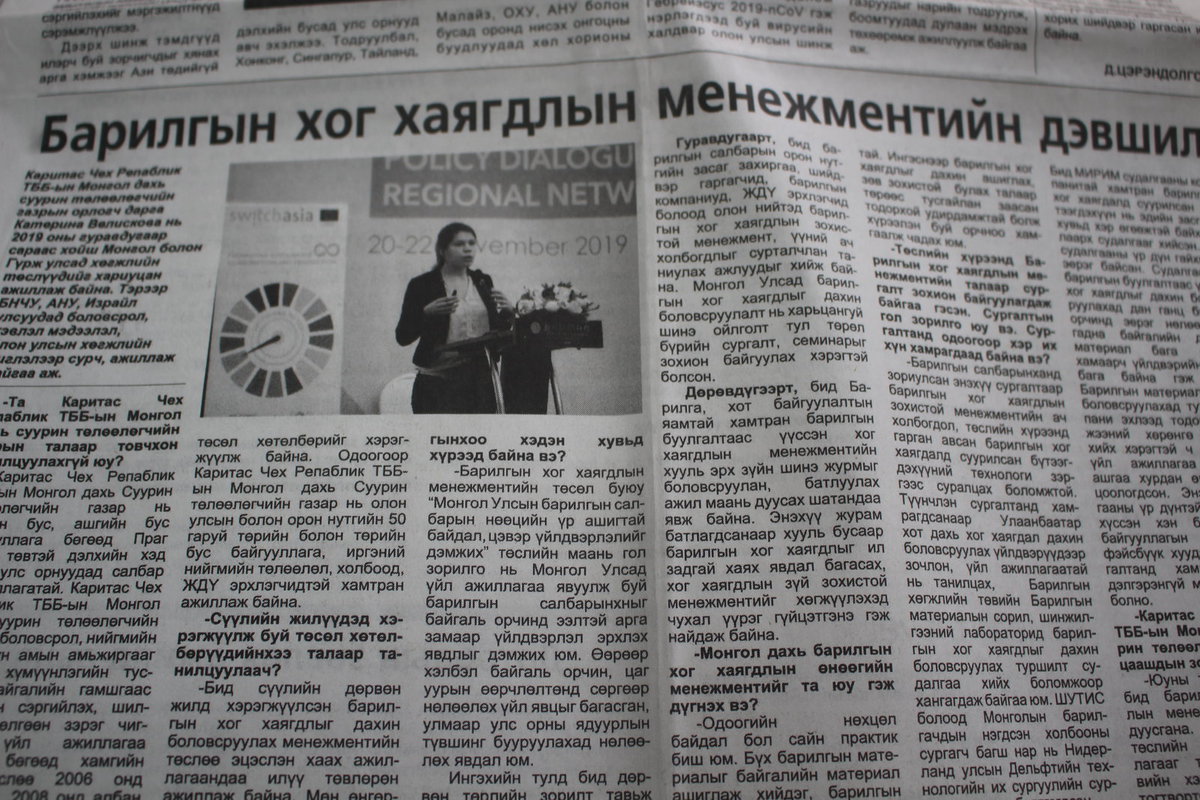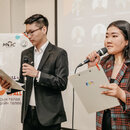The Media campaign continues on the Daily newspaper to improve Public awareness on Construction Demolition Waste product under the "Improving Resource Efficiency and Cleaner Production in Mongolian Contraction sector through Materials Recovery" project funded by European Union, EU SWITCH-Asia Programme, and Czech Development agency.
Advances construction waste management
Katerina Veliskova is the Acting Head of Mission of Caritas Czech Republic in Mongolia. She has been working for Caritas Czech Republic since March 2019, implementing development projects in Mongolia and Georgia. She has studied and worked in the Czech Republic, United Kingdom, Israel and Mongolia and focused her work on the fields of education, journalism or international development.
Can you briefly introduce Caritas Czech Republic (CCR) in Mongolia INGO?
Caritas Czech Republic (CCR) is a nongovernmental and non-profit organization with headquarters in Prague and several offices around the world. The mission of CCR is to improve the lives of thousands of people through education, promotion of sustainable development, restoring livelihoods and empowering local communities. CCR launched its first project in Mongolia in 2006 and opened its country’s mission in 2008 as a response to the growing support of the Czech development cooperation.
Since 2006, CCR has implemented more than 20 projects in 15 different provinces (aimags) with particular focus on pre-school and vocational education, human rights, social work, restoring livelihood, humanitarian assistance, prevention of risks of natural disasters, agriculture, and environment and recycling. Since 2012, CCR has been consistently focusing on environmental protection and sustainable development with the help of projects funded by the European Union, which targeted the construction sector, waste management and plastic recycling. In Mongolia, CCR cooperates with more than 50 international and local NGOs, CSOs, associations, SMEs, state institutions and local governments.
Currently, what projects are you implementing?
Most of our work currently revolves around finalizing our project on recycling construction waste, which we have been working on for the past four years.
We have recently successfully finished a rural development project, in which we focused on supporting farmers in the Khentii province. In this project, we managed to improve the coordination of local farmers and cooperatives, improve their access to the local market and assisted in agricultural development by building greenhouses and cellars.
What is exciting is that we are also just starting a new project targeting Mongolian youth. Thanks to this project, we are hoping to empower young people in Mongolia to become active members of the society, both by increasing their employment opportunities and their participation in politics.
What are the objectives of your project “Improving Resource-Efficiency and Cleaner Production in the Mongolian Construction Sector through Materials Recovery” and which ones have been already achieved?
The main goal of this project is to encourage Mongolian companies in the construction sector to switch to a more efficient and environmentally friendly way of working, thus contributing to “SCP”, which is the abbreviation of the term “sustainable consumption and production”. In the broadest sense, we are working to limit the effects of climate change and to contribute to the reduction of poverty in the country.
In order to do this, we are focusing on four main areas. The first one was that we have done a lot of research and together with the Mongolian University of Science and Technology, Mongolian National Recycling Association and the Delft University of Technology from the Netherlands and developed a prototype of a construction material made partially from demolition waste.
The second important area was the development of new educational materials for university students and companies in the construction sector. For example, we are hoping to launch a new university curriculum on construction and demolition waste management at MUST in the next academic year.
Thirdly, we have focused a lot on explaining the importance of proper waste management in the construction sector among the general public, Mongolian construction companies as well as local authorities and decision makers. The concept of recycling, particularly of construction waste is quite new to Mongolia, so a lot of our work also included various trainings, seminars and workshops, which we are now finishing.
Lastly, we are now finishing a new legal procedure on construction and demolition waste management together with the Ministry of Construction and Urban Development. We are hoping that this procedure will bring clear guidelines and regulations, so that illegal dumping of waste is limited and proper management of waste can be ensured.
Can you share with us what the current state of construction and demolition waste management in Mongolia is?
Currently, the situation is not ideal. Nearly all construction material is produced from raw materials and illegal dumping of construction waste is unfortunately very common. On top of that, the booming and rapid growth of the Mongolian construction sector means that this problem is becoming more and more serious.
As I’ve mentioned, the concept of recycling and reusing construction materials is relatively new in Mongolia, so a lot of the people in the field still need to be more informed about the problems associated with improper waste management. Moreover, the legal framework for the management of construction and demolition waste needs to be much more develop, so that there are clear guidelines and regulations ensuring efficient use of resources and environmental protection.
Training on Construction Demolition Waste Management has been organized for SMEs in the construction sector under this project. How many participants are currently involved in this training? What is the main goal of this training?
This training is an excellent opportunity for construction and demolition companies to learn more about the importance of proper waste management, the benefits of recycling and the prototype of a product made partially from demolition waste, which we have developed in the project. At the end of the training, the participants will receive a certificate, which will help them in their own professional development.
So far we have trained over 300 SMEs in the construction sector and will train more until the end of project completion. We trained not only the participants in UB but also construction representatives in Darkhan and Erdenet city. Out training is special in the fact that it also offers opportunities for the training participants to visit recycling companies in Ulaanbaatar to learn about recycling sector in Mongolia as well as construction materials testing process at laboratory of CDC. Our trainers from MUST and MBA were trained and prepared on CDW management at TUD in the Netherlands.
Is CDW based product feasible and profitable?
This was a key question that we needed to answer in our project. We have therefore partnered with a research company MIRIM, who conducted a feasibility study on the product. The results were surprising and very positive. According to our data, the product would not only be more environmentally friendly, but it would also make the production cheaper, because it would lower the amount of raw materials needed in the production process. For sure, companies would also need to invest a little bit at the start, but these investments could return to them quite quickly. For anyone interested, the full research report can be found through our website or at one of our events or trainings.
What are the future plans of CCR in Mongolia?
First of all, we are hoping to finalize this project on construction demolition waste this year and make sure that the local authorities and companies have the necessary tools to continue improving the sector.
As I’ve mentioned earlier, we are also just starting a completely new project focusing on young people in Mongolia, which should empower them to create change in their local communities.
Last but not least, we are also hoping to start one more project this year, which will more closely follow our work on waste management. This time, we would like to focus on the issue of plastic waste and encourage plastic recycling. We can only hope that we will be able to achieve as much and establish as many partnerships with local stakeholders as we did in our construction project.






